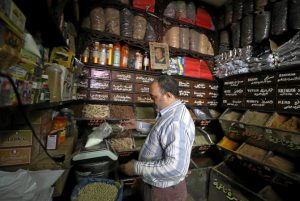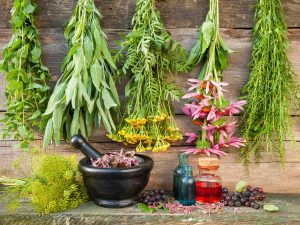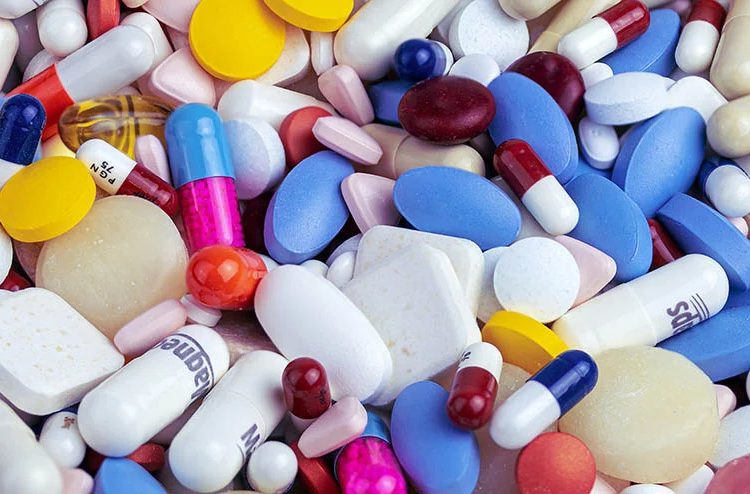High blood pressure is perhaps the most common ailment in Egypt. Never mind, have a cup of hibiscus tea, known as kerkadeh. Simply let the stress caused by traffic jams, incompetent workmen trashing your home in the name of repair or improvement, not to mention backchat from the kids, fade away.
If you yearn for a lighter skin colour — the pallour that prompts others to advise you not to expose yourself to direct sunlight — you will not have to take out an overdraft for those imported creamy substances. Find some bark of a willow tree, boil it up and extract the salicylic acid for that glowing, youthful complexion.
For that sore throat, whooping cough and angina, have a swig of a hot infusion of lemon verbena. As a diuretic, this plant will enable you to rid yourself of retained fluid.
If the price of prescription drugs depresses you, aniseed will be just what the doctor ordered. You will also keep stomach ulcers at bay with this liquorice-scented infusion.
“Painkillers take away the agony and my disposable income”
This is all fine and dandy, especially since the prices of old and trusted remedies from your local pharmacy go up faster than inflation in Germany’s Weimar Republic.
Ahmed Ali is a schoolteacher and father of four who complained that the mark-up on medication is beyond his wallet.
“Medicines have become very expensive and I just can’t afford it,” Ali told this paper. “I’ve got two slipped discs so you can imagine the excruciating pain I’m in. Painkillers take away the agony and practically all my disposable income.”
Ali switched to herbal remedies. Oils and herbs alleviate his suffering. And they are well within his budget.
The shop where Ali buys his herbal analgesics is owned Samy el-Attar, whose family name is also Arabic for ‘perfumer’. (Perhaps a tenuous connection with aroma therapy, by which King Charles III swears.)
El-Attar said that substitutes can be found for most pills and capsules to treat any ailment, except the terminal sort.

“A herbal concoction…works out far cheaper than any drug with a Greek-sounding name.”
The walls of el-Attar’s shop are lined with drawers and shelves with all manner of leaves, seeds and twigs, each said its own unique healing property. The predominant sound is the rustle of cellophane wrapping, not the clatter of pills into plastic bottles. Customers crowd at the counter, while staff fill little bags with leaves, seeds and twigs.
Customers tell el-Attar about their symptoms and he puts together a concoction of herbs, which works out far cheaper than any drug with a pseudo-Latin or Greek-sounding name.
Herbal remedies went out of favour with the advent of allegedly effective cures and no fuss. Unscrew the childproof top and pop a couple of pills into mouth. Alas, the prices are not inflation-proof or subject to rising costs of raw materials. Nowadays, humble herbs are now back in fashion.

“In the first eight months of this year, prices at least 2,000 preparations went up 15 per cent.”
Ali Ouf, who is chairman of the Drug Division of the Federation of Egyptian Chambers of Commerce said: “In the first eight months of this year, prices of at least 2,000 preparations went up 15 per cent.”
“Rising shipping, materials and energy costs are primarily to blame for the price hikes,” Ouf added.
‘Alternative Medicine: A Global and Local Overview’ is the title of a recent report by the cabinet Information and Decision Support Centre.
The report explores the concept of alternative medicine and assesses the status of conventional medicine in Egypt.
Inflation has rocketed since the coronavirus epidemic and the outbreak of the war in Ukraine, hence the inclination towards what the WHO terms ‘complementary medicine’, which is still widely used across nations.
Globally, alternative medicine was worth $100 billion in 2021 and that figure is projected to make the $315.5 billion by 2027.
“Intellectual property rights, what intellectual property rights? The ancients had no need for them.”
The WHO formulated a strategy for traditional for 2002-2005 in recognition of the evolving needs and the expanding landscape of alternative medicine. The organisation updated its vision for the period 2014 to 2023, which prompted member countries to integrate traditional, folk, or complementary medicine into their healthcare systems to the extent that many health insurance companies are now offering cover for herbs as well as pills.
Alternative medicine is bringing in the big bucks. The profits are swelled by e-commerce reaching millions of customers.
Consequently safe products and clinical practices have to be identified in view of varying levels of education and legislation regulating practices and practitioners of alternative medicine, with a view to ensuring professional consistency at global level.
As for intellectual property rights, what intellectual property rights? The ancients had no need for them, why should we be any different? You can grow lemon verbena on your balcony. You can pick hibiscus flowers from the neighbours’ front garden, but do it quietly, preferably after dark.






Discussion about this post